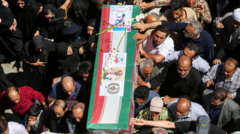UN nuclear watchdog warns Iran could resume uranium enrichment for potential weaponry in months following recent military strikes.
Tensions Rise as Iran Poised to Restart Uranium Enrichment, Says IAEA Chief

Tensions Rise as Iran Poised to Restart Uranium Enrichment, Says IAEA Chief
Rafael Grossi highlights precarious nuclear developments amid US-Iran relations.
In a concerning development, Rafael Grossi, Director General of the International Atomic Energy Agency (IAEA), indicated that Iran is on the brink of resuming uranium enrichment capabilities that could lead to nuclear weapon production in a matter of months. This statement carries weight following recent military strikes ordered by the U.S. on Iranian nuclear sites, particularly targeting Fordo, Natanz, and Isfahan.
Grossi challenged earlier assertions made by former President Donald Trump, who claimed that the attacks had completely dismantled Iran’s nuclear facilities. According to Grossi, while the U.S. strikes caused significant damage, they did not eliminate Iran's nuclear capabilities, saying, “one cannot claim that everything has disappeared and there is nothing there.”
The military actions took place amidst rising fears that Iran was nearing the threshold of building a nuclear weapon. Despite ongoing tensions, Grossi expressed hope that diplomatic negotiations could still take place, even as Iran has taken steps to suspend its cooperation with the IAEA, alleging bias against the agency from Western nations.
In the wake of the strikes, opinions within Iran regarding the impact of the attacks appear divided. Supreme Leader Ayatollah Ali Khamenei downplayed the extent of the damage, while Foreign Minister Abbas Araghchi described the consequences as “excessive and serious.”
Despite a current ceasefire between Iran and Israel, Trump has stated that he would not hesitate to employ military action if intelligence reveals that Iran is advancing its uranium enrichment capabilities once more. This development unfolds amidst a backdrop of increasing frustration over the unraveling of the 2015 nuclear deal, which had placed restrictions on Iran's nuclear activities.
Since the U.S. pulled out of the agreement in 2018 and reinstated sanctions, Iran has progressively breached terms, leading to the acquisition of uranium enriched to levels potentially suitable for nuclear weapons. The IAEA reported that Iran has amassed enough 60% enriched uranium to construct up to nine nuclear bombs. Whether diplomatic solutions can be achieved remains uncertain as tensions continue to escalate.
Grossi challenged earlier assertions made by former President Donald Trump, who claimed that the attacks had completely dismantled Iran’s nuclear facilities. According to Grossi, while the U.S. strikes caused significant damage, they did not eliminate Iran's nuclear capabilities, saying, “one cannot claim that everything has disappeared and there is nothing there.”
The military actions took place amidst rising fears that Iran was nearing the threshold of building a nuclear weapon. Despite ongoing tensions, Grossi expressed hope that diplomatic negotiations could still take place, even as Iran has taken steps to suspend its cooperation with the IAEA, alleging bias against the agency from Western nations.
In the wake of the strikes, opinions within Iran regarding the impact of the attacks appear divided. Supreme Leader Ayatollah Ali Khamenei downplayed the extent of the damage, while Foreign Minister Abbas Araghchi described the consequences as “excessive and serious.”
Despite a current ceasefire between Iran and Israel, Trump has stated that he would not hesitate to employ military action if intelligence reveals that Iran is advancing its uranium enrichment capabilities once more. This development unfolds amidst a backdrop of increasing frustration over the unraveling of the 2015 nuclear deal, which had placed restrictions on Iran's nuclear activities.
Since the U.S. pulled out of the agreement in 2018 and reinstated sanctions, Iran has progressively breached terms, leading to the acquisition of uranium enriched to levels potentially suitable for nuclear weapons. The IAEA reported that Iran has amassed enough 60% enriched uranium to construct up to nine nuclear bombs. Whether diplomatic solutions can be achieved remains uncertain as tensions continue to escalate.





















